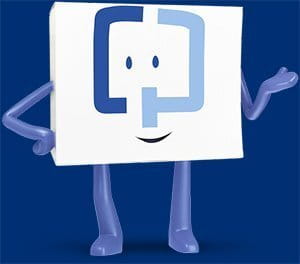Real Cologuard®
story: Meghan
Colorectal cancer survivor, screened with Cologuard
“Has a colon cancer diagnosis changed my life? Yes. Am I a different person because of it? Yes. Do I share my story all the time? Yes.”
Will Meghan stop telling everyone she knows – from social media to strangers – to get screened?
No chance.
“People are probably sick of hearing about it, but I don’t care. I’ve had so many people tell me they got screened because of me.”
For Meghan, it started with asking her healthcare provider if Cologuard could be an appropriate option. It checked all the right boxes for Meghan, since it is noninvasive and done right at home, and for her provider, since Meghan met the screening age and was at average risk.
What she didn’t expect was to get a call from her healthcare provider telling her the Cologuard result was positive and that she’d need a colonoscopy to complete her screening. But Meghan tried not to get ahead of herself – no stressing, no searching, no thinking what if. Just one thing at a time.
That’s what made her stage III colon cancer diagnosis even more shocking.

Meet Meghan.
Screened with Cologuard
“Never in my wildest dreams did I think this was a path I was going to go down.”
But Meghan wasn’t alone on that path. Her husband, trusted surgeon, and healthcare provider all guided her through a blur of scans, tests, and the news that she’d soon have surgery and begin three months of chemotherapy.
“That was hard. Chemo is so taxing on your body, far worse than surgery,” she explained. “I was nauseous, I was exhausted, and I had lost a lot of my hair. But I made it through.”
The opportunity to share with as many people as possible is what pulled her through her summer of treatment. It required very little of Meghan – just a few moments on social media – and offered so much reward. It sustains her now: every message from a friend who said they screened because of her, every chance she has to help a friend get screened, every time she can proudly share that she is on the other side of treatment.
“I could have gotten my diagnosis, gone through treatment and been done with it,” she said.
But that’s just not who Meghan is.
She’s a helper, always has been. And she doesn’t want anyone to go through what she did, not a diagnosis and certainly not chemotherapy. Especially not when colon cancer is more treatable when it’s caught in earlier stages.1*
As tough as that was, though? Meghan wouldn’t change a single thing. “It’s interesting: I feel very lucky that I’ve been able to go through this and be OK,” she said. “Maybe this happened to me so I can help more people.”
*Based on 5-year survival
This story reflects one individual’s experience. Not every person will have the same treatment, experience, outcome, or result. Cologuard is prescribed by your health care provider. Talk to your health care provider about available screening options and whether Cologuard may be right for you. There are potential risks associated with the Cologuard test and it may not be appropriate for all patients. For more information about the risks, talk to your health care provider or visit Cologuard.com/risk-information for more information.References
1. National Cancer Institute. Cancer stat facts: colorectal cancer. Accessed December 4, 2023. https://seer.cancer.gov/statfacts/html/colorect.html
Cologuard is intended to screen adults 45 years of age and older who are at average risk for colorectal cancer by detecting certain DNA markers and blood in the stool. Do not use if you have had adenomas, have inflammatory bowel disease and certain hereditary syndromes, or a personal or family history of colorectal cancer. Cologuard is not a replacement for colonoscopy in high risk patients. Cologuard performance in adults ages 45-49 is estimated based on a large clinical study of patients 50 and older. Cologuard performance in repeat testing has not been evaluated.
The Cologuard test result should be interpreted with caution. A positive test result does not confirm the presence of cancer. Patients with a positive test result should be referred for colonoscopy. A negative test result does not confirm the absence of cancer. Patients with a negative test result should discuss with their doctor when they need to be tested again. False positives and false negative results can occur. In a clinical study, 13% of people without cancer received a positive result (false positive) and 8% of people with cancer received a negative result (false negative). Rx only.

